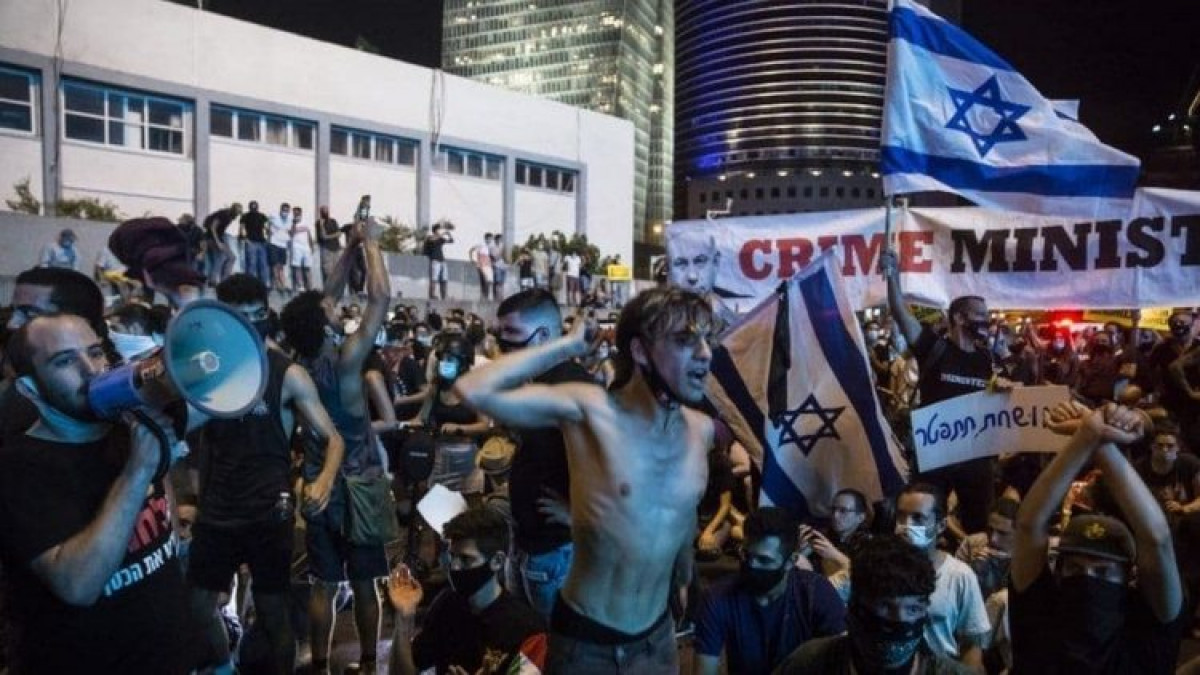 98
98
The second half of our article will concentrate on Israel’s three most critical domestic challenges:
1) In recent days, the Zionist regime has faced an alarming danger posed by anonymous hacker groups gaining access to vital Israeli websites. According to Zionist sources, the hacking group “Moses Staff” targeted Israeli tax consulting firms. The group has embarked on publishing the personal and financial details of its victims. Yet, the Zionist media did not disclose any more details on the breach. In this context, Moses Staff staged a cyberattack on a gay dating website, exposing the personal information of thousands of Israeli LGBT people. Furthermore, the group launched a cyber-attack on three major engineering firms in Israel, stealing their data. The anonymous cyber hacking team stole the companies’ projects, contracts, photographs, letters, and video conferences. As part of an astonishing exposé, Moses’ Staff posted a highly intimate image of Israeli War Minister Benny Gantz with the statement: “We are aware of all your choices, and we are finally targeting something you do not expect.” The information provided by Moses Staff was accompanied by a letter that said, “We will continue to fight until your crimes are revealed, and we will pursue your actions even if you are unaware. This is only a fraction of what’s to come.” Another hacker group, the ‘Black Shadow’, has claimed responsibility for bringing down the servers of the Israeli Internet provider, Cyberserve, and has threatened to release its database. It’s important to note that the Zionist state’s largest hospitals were recently attacked by cyber-attacks. According to observers, cyber-attacks are expected to hit Israel regularly, ultimately shutting down all internet services.
2) In recent decades, the Israeli Army has encountered considerable challenges as a consequence of rising religious sentiments among Arabs residing in the Occupied Territories of 1948, as well as a growing unwillingness to serve in the army. Many Israeli politicians and journalists have recently voiced concern over the army’s deteriorating situation, urging Tel Aviv’s political and military authorities to act. A military journalist for the Hebrew-language website Walla described different aspects of the Israeli Army’s issue, emphasising that senior military officers were particularly worried. Israel’s ground troops are in a predicament they haven’t faced in decades, and recent military confrontations in Gaza and Lebanon have shown their frailty in dealing with Islamic resistance. The website ascribed the Israeli army’s many challenges to demographic, sociological, and ideological splits within Israeli society, as well as sectarianism and rising prejudice and animosity toward Arabs, including Muslims and Druzes. “Amir Bukhbout,” a military journalist for the Walla website, says the Zionist army’s issues are multidimensional, noting that the number of Arabic-speaking troops has declined dramatically while the number of desertions has climbed considerably. “Persuading Arab youth to join the military is extremely problematic,” Bukhbout said, alluding to the Arab community’s growing pan-Arab nationalism and religious awakening. For the first time in Israeli history, Arabs obstructed traffic and hurled stones at Israeli police during Operation Guardian of the Walls, prompting Chairman of the Joint Chiefs of Staff, Aviv Kochavi, to seek a full inquiry and a solution to the Arab insurgency.
“Persuading Arab youth to join the military is extremely problematic,” he said, alluding to the Arab community’s growing pan-Arab nationalism and religious awakening. For the first time in Israeli history, Arabs obstructed traffic and hurled stones at Israeli police during Operation Guardian of the Walls, prompting Chairman of the Joint Chiefs of Staff, Aviv Kochavi, to seek a full inquiry and a solution to the Arab insurgency. According to the military reporter, Israel must abandon David Ben-Gurion’s fantasies of having the Israeli Army represent all walks of life and religions. On the other side, the Arabs in the occupied areas have now become a factor in lowering the Israeli Army’s effectiveness and capacities. During the last 12-day assault on Gaza, Arabic-speaking heavy machinery drivers, for example, refused to transport soldiers and military equipment to the border. Arabs in the Occupied Territories were wary of joining the Israeli army, according to Zionist sources, because of Hamas and Palestinian rhetoric, as well as the fact that these groups sometimes publish images and addresses of Israeli army personnel who spoke Arabic on the internet. Military desertion, on the other hand, has had a detrimental impact on the performance of the Israeli army. In recent years, ultra-Orthodox Haredi Jews and Ethiopians have largely deserted the Israeli military. The Haredis have held large-scale demonstrations in the past against military service duties for this small but powerful community of extreme Jews. Only 30% of fugitives from the barracks are arrested and returned to conscription, according to the latest surveys, while only 50% of Israeli youth desire to join the army and be drafted. Meanwhile, an increase in suicides, drug use, and sexual harassment among Israeli soldiers has puzzled army leaders.
3) In recent years, the Zionist authority has faced a grave challenge in the form of suspicious burning in forests and sensitive security sites. On November 29, a fire at a facility near the Dimona nuclear reactor severely damaged the plant’s machinery. In August, it was widely reported that the Zionist authorities had failed to put out a massive fire in occupied Palestine. According to Zionist radio, Jordan, Greece, and Cyprus have agreed to aid Israel in putting out fires in the highlands around Bayt al-Muqaddas. Similar requests have been made by France, Italy, and Croatia. Channel 7 of the Zionist authority also stated that special fire teams from Ben Gurion airport had joined the desperate firefighting forces to put out the fires that had been raging in the highlands of occupied Bayt al-Muqaddas.
Comment
Post a comment for this article